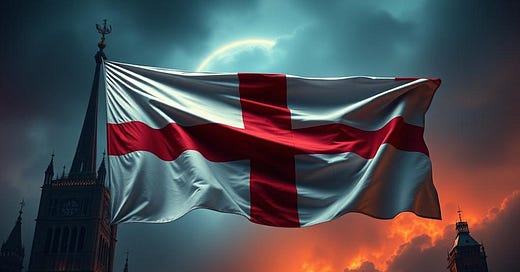The taboo of Englishness. Why is there such a taboo?
There’s no identity in Britain today more controversial than the English identity. It’s perfectly acceptable to celebrate being Scottish, Welsh, Irish, Nigerian, Pakistani, Caribbean, Chinese, Arab, or Jewish. But the moment anyone talks about being English, about Englishness as an identity or ethnicity, the conversation shuts down.
Say you’re proud to be English and you’ll be accused of racism, white supremacy, or colonial nostalgia. You’ll be told English ethnicity is far too “exclusive,” too toxic or too “tainted by history.”
But.
Ethnic identity is naturally exclusive. To say you’re part of one ethnic group usually means you’re not part of another. We define who we are partly by recognising who we are not. Identity always involves drawing boundaries, even if those boundaries can shift or overlap. Some people have mixed backgrounds or complex identities, but that doesn’t mean anyone can claim all identities. We can’t be all things to all people. This exclusivity isn’t necessarily a bad thing. It’s part of how humans create meaning and make sense of the world.
The real problem isn’t that identities draw lines, it’s that we’ve become so obsessed with moralising those lines. People act like any boundary is hateful or evil instead of a simple factual reality. It’s completely normal that Englishness is tied to ancestry, history, cultural roots stretching back centuries. You either have those roots, or you don’t.
Me personally? I don’t. My heritage is Nigerian. That doesn’t make me less of a person, it just means I’m not ethnically English. And so what? Why is this controversial? Telling me I’m not ethnically English isn’t some racist insult. It’s a fact. And it’s nothing to cry about or throw tantrums over.
That doesn’t make me less of a person, it just means I’m not ethnically English.
I don’t think English people should have to tiptoe around their identity just in case someone gets offended. Ethnic pride doesn’t automatically mean hating outsiders. It simply means recognising who you are and where you came from. English ethnicity is exclusive. It should be. Every ethnic identity is.
Also, historical baggage doesn’t mean an ethnic group ceases to exist. The English, like every other people on earth, have chapters of history that are dark and shameful. Empire. Colonialism. Slavery. But so do the Chinese, Japanese, Turks, Arabs, and countless others. Nobody suggests abolishing Chinese identity because of imperial conquest, or dissolving Turkish identity because of the Armenian genocide. So why single out the English?
The idea that English people should feel ashamed even to name themselves as an ethnic group is completely absurd. More importantly, the people living today did not commit the sins of their ancestors. So why should their present identity be erased because of that?
Many on the progressive left often insist Englishness is dangerous, inseparable from racism, colonialism, exclusion. Simply suggesting the English might be an ethnic group with deep historical roots is treated as borderline fascist.
Yet those same people who call Englishness racist often turn around and insist that “black and brown people” like me must be English. If you’re a minority in Britain, the same people who condemn English identity as toxic will practically force it onto you.
When Suella Braverman said she was British but not English, she was crucified for it. But when white English people talk about being ethnically English, they’re seen as suspicious, out of touch or smeared as racists or nationalists.
It’s as if Englishness is allowed, even required, for minorities, but somehow forbidden for the ethnic English themselves. White people asserting Englishness are told they’re racists. Minorities declining Englishness are branded delusional or accused of pandering to the far right."
The left wants Englishness to exist only as a symbolic tool to prove their own anti-racism and open-mindedness. It’s useful for them to parade black and Asian people as proudly English so they can say: “Look, we’re not racist. Englishness is for everyone.”
But when white English people talk about Englishness as an ethnic identity, suddenly it’s a crime. Suddenly it’s Enoch Powell. Suddenly it’s white nationalism.
This refusal to talk honestly about Englishness has consequences.
It fuels resentment. It leaves a vacuum that extremists rush to fill. It cuts ordinary people off from their history and sense of belonging. And it makes it impossible to have serious conversations about integration, multiculturalism, and the future of the nation.
Let’s get something straight. There is nothing wrong with Englishness.
Ethnically, it refers to people descended from historic populations - Anglo-Saxons, Normans, Vikings - whose culture, traditions, and institutions shaped England over centuries. Yes, it overlaps with being white because of demographic history, but it’s not just about race.
Culturally, ‘Englishness’ may be broader. It’s the customs, language, humour, values, ways of life anyone can adopt if they choose. You can be culturally English without being ethnically English. But that doesn’t erase the ethnic English as a people..
English people deserve the same right as any other group to name themselves, tell their story, and celebrate who they are.




